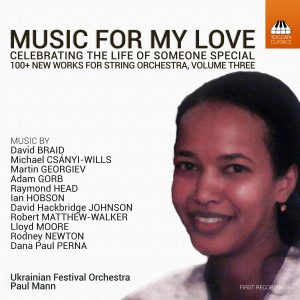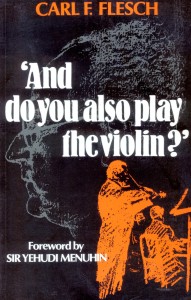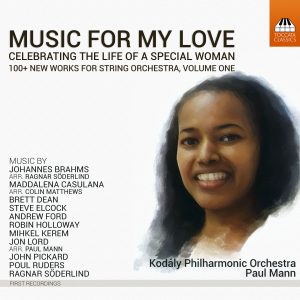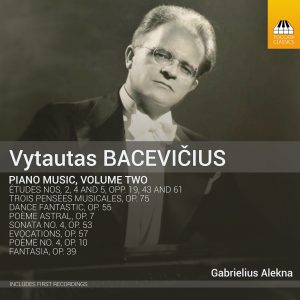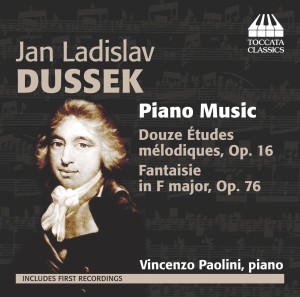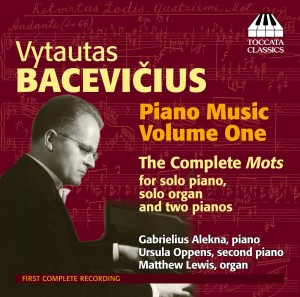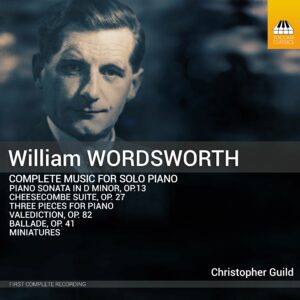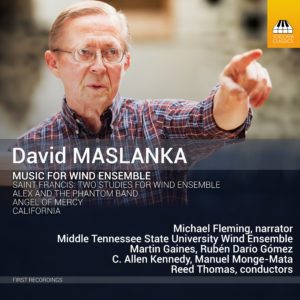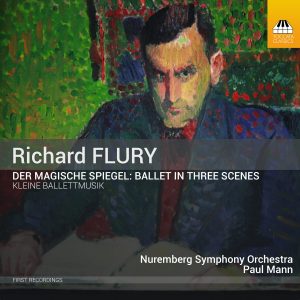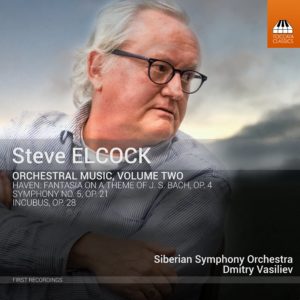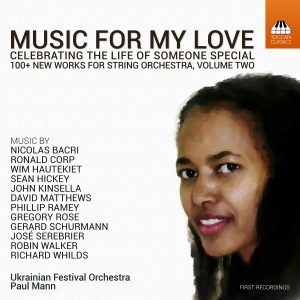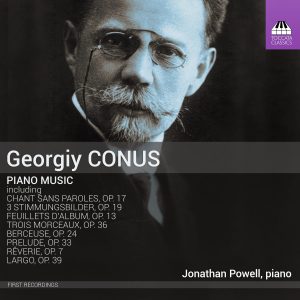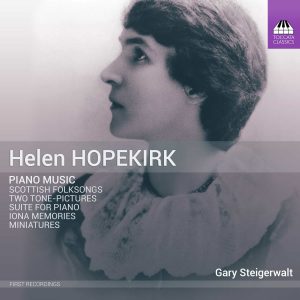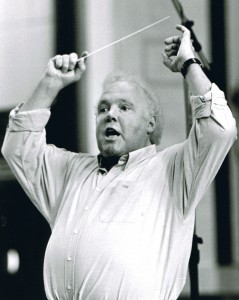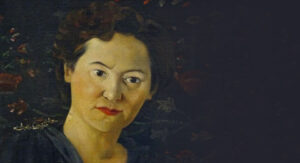Search Results for "goz akimi efekt"
Showing results for gã akin effect
MUSIC FOR MY LOVE: Volume Three
Celebrating the Life of Someone Special
100+ New Works for String Orchestra, Volume Three
When Yodit Tekle was diagnosed with stomach cancer in late 2014, her partner, Martin Anderson, who runs Toccata Classics, asked a few composer friends to write some music for strings to bring her comfort in her illness. As her life slipped away, he had the idea that she might be remembered in music and so he began to commission other pieces for string orchestra in her memory. To his surprise, almost everyone he asked generously agreed, and so the project snowballed: there are now over 100 composers who have written or agreed to write for it – in an undertaking that is probably unique in the history of music. This third volume presents eleven more pieces in an initiative which, in effect, transforms love into something you can hear.
(Learn more at musicformylove.org)
Ukrainian Festival Orchestra
Paul Mann
‘And do you also play the violin?’
Foreword by Sir Yehudi Menuhin
Extant: 382
Composition: Demy octavo ~ Profusely illustrated with facsimiles and photographs ~ Index
Join the Discovery Club!
[woocommerce_cart_notice type='products']Massive Savings on Toccata CDs, Downloads and Books PLUS A £30 VOUCHER to welcome you on board!
Membership of the Discovery Club brings you huge savings on all Toccata Classics recordings and all Toccata Press music books – with the added advantage that you can enjoy the new releases and publications well before they reach the rest of the world. And you'll have the satisfaction of knowing that you are helping to rewrite musical history and right some historical wrongs!
Music For My Love, Vol. One
CELEBRATING THE LIFE OF A SPECIAL WOMAN
100+ NEW WORKS FOR STRING ORCHESTRA, VOLUME ONE
When in late 2014 Yodit Tekle was diagnosed with stomach cancer, her partner, Martin Anderson, who runs Toccata Classics, asked a couple of composer friends to write some music to bring her comfort in her illness. As her life slipped away, he had the idea that she could be remembered in music and so he began to commission other pieces for string orchestra in her memory. To his surprise, almost everyone he asked generously accepted, and so the project snowballed: there are now over 100 composers who have written or agreed to write for it – an undertaking unique in the history of music. This first volume presents the first eleven pieces in an initiative which, in effect, transforms love into something you can hear.
Kodály Philharmonic Orchestra
Paul Mann, conductor
Vytautas Bacevičius: Piano Music, Volume Two
The Lithuanian pianist and composer Vytautas Bacevičius (1905–70) is one of the undiscovered pioneers of the twentieth century. This second volume of his piano music presents works written between 1927 and 1966 and shows the evolution of his musical language from the post-Skryabin style of the early works, via the influence of Debussy, Prokofiev and Stravinsky, to a highly individual modernism, akin to that of his fellow radicals Edgard Varèse and Stefan Wolpe – all three of them Europeans in exile in New York.
Gabrielius Alekna, piano
Jan Ladislav Dussek: Piano Music
The compositions of the Czech-born Jan Ladislav Dussek (1760-1812) show the Classical style gradually taking on the expressive characteristics of Romanticism, foreshadowing composers like Beethoven, Chopin, Schubert and Schumann. The Douze Études mélodiques (also published as Leçons progressives) offer a sort of musical United Nations of the day, its Polish, Russian, Scottish, Spanish, Turkish and other national elements intended to appeal to the contemporary fashion for the exotic. His F major Fantaisie is in effect an eight-movement suite, presenting an array of musical forms and capturing the improvisatory spirit and harmonic exploration of the fantasia.
Vincenzo Paolini, piano
Vytautas Bacevičius: Piano Music, Volume One
The Lithuanian pianist and composer Vytautas Bacevičius (1905-70) is one of the undiscovered pioneers of twentieth-century music. His series of seven Mots ('Words') for keyboard — five for solo piano, one for organ and one for two pianos — were written between 1933 and 1966 and show the evolution of his musical language from the post-Skryabin style of the early works, via the influence of Prokofiev and Stravinsky, to a highly individual modernism, akin to that of two fellow radicals, Varése and Wolpe.
Gabrielius Alekna, piano
Matthew Lewis, organ
Ursula Oppens, piano
William Wordsworth: Complete Music for Solo Piano
The reputation of the Anglo-Scottish composer William Wordsworth (1908–88), great-great-grandnephew of the poet, has recently been restored by a series of Toccata Classics albums of his orchestral music. His piano music, too, was poorly known before now, none of it recorded since a handful of pieces appeared on LP 60 years ago – though his epic Piano Sonata is a work of major importance. This first ever complete recording reveals an honest, unfussy approach to the keyboard akin to that of two other major symphonists, Sibelius and Rubbra: like them, Wordsworth’s primary concern seems to have been the expression of deep feeling – which makes the gentle story-telling of his miniatures for children all the more surprising.
Christopher Guild, piano
David Maslanka: Music For Wind Ensemble
Although the American composer David Maslanka (1943–2017) wrote in a wide range of genres, it is for his generous output of music for wind band that he is best known. Three of the works heard here are in effect symphonic poems, all three infused with that big-hearted sense of space found in the best of American music and the quiet dignity of those endless open landscapes, but also energised by a powerful sense of freewheeling drama. The fourth piece is a charming and hugely engaging presentation of the instruments of the symphonic wind ensemble, a latter-day Peter and the Wolf – likewise intended for children and similarly bubbling with good tunes. The composer himself was closely involved in the preparation for these recordings – the last major project involving his music before his death – which now stand as a testament to a man much-loved in American musical circles.
Middle Tennessee State University Wind Ensemble
Michael Fleming, narrator (Track 2)
Reed Thomas, conductor (Track 1)
Rubén Darío Gómez, conductor (Track 2)
C. Allen Kennedy, conductor (Track 3)
Manuel Monge-Mata, conductor (Track 4)
Martin Gaines, conductor (Track 5)
Richard FLURY: Ballet Music
Der magische Spiegel (‘The Magic Mirror’), a 1954 ballet by the Swiss composer Richard Flury (1896–1967), tells a pantomime tale of flirtation, cuckoldry, magical spells and perdition – but this is no puritanical morality play: using the limited resources of a chamber orchestra to surprisingly full-bodied effect, Flury conjures up a delightful sequence of dances – a generous number of waltzes, with a czardas, a bolero and more – that skip past in good-humoured succession. And behind its innocent title, the Little Ballet Music of thirty years earlier hides a buoyant dance-suite, scored with a feeling for colour that would have gone down well in Hollywood.
Steve ELCOCK: Orchestral Music, Volume Two
This second volume of orchestral music by the English composer Steve Elcock (b. 1957), long since resident in France, brings three powerful works all with their origins in earlier pieces. Incubus examines the terrors of nightmare-riven sleep in a vigorous symphonic essay based on a movement from Elcock’s string quartet Night after Night. The impulse behind Haven, an expansive and surprisingly muscular fantasy, is the Sarabanda theme from Bach’s First Partita for solo violin. And Elcock’s Fifth Symphony takes its cue from the most famous of all Fifth Symphonies, re-examining Beethoven’s structural logic in Elcock’s own musical language to produce a volcanic new Fifth, its charge of wild energy husbanded to maximum dramatic effect.
Siberian Symphony Orchestra
Andrey Lopatin, violin (Track 2)
Grigorii Vever, clarinet (Track 5)
Evgeny Plaksin, horn (Track 5)
Dmitry Vasiliev, conductor
FIRST RECORDINGS
Music For My Love, Volume Two
When Yodit Tekle was diagnosed with stomach cancer in late 2014, her partner, Martin Anderson, who runs Toccata Classics, asked a few composer friends to write some music for strings to bring her comfort in her illness. As her life slipped away, he had the idea that she might be remembered in music and so he began to commission other pieces for string orchestra in her memory. To his surprise, almost everyone he asked generously agreed, and so the project snowballed: there are now over 100 composers who have written or agreed to write for it – in an undertaking that is probably unique in the history of music. This second volume presents twelve more pieces in an initiative which, in effect, transforms love into something you can hear.
Ukranian Festival Orchestra
Paul Mann, conductor
Georgiy Conus: Piano Music
Georgiy Eduardovich Conus (1862–1933) is one of the astonishing number of gifted Russian composer-pianists who helped shape what is known as the ‘Silver Age’ of Russian music, but whose achievements have since been obscured by the music of Rachmaninov and others. This first-ever recording of his piano music reveals a composer with his roots in Tchaikovsky, a harmonic sophistication akin to Skryabin’s and an emotional range that stretches from an easygoing charm to dramatic and powerful keyboard virtuosity.
Jonathan Powell, piano
Helen Hopekirk: Piano Music
The Scottish musician Helen Hopekirk (1856–1945), regarded as one of the major concert pianists of her generation, also made a lasting contribution as a piano teacher in Boston after her emigration in 1897. As a composer, she forged an intriguing path by turning to the music of her native country as the wellspring of her creativity: the early pieces can sound like Brahms in the Highlands, and her later works marry Debussyan Impressionism with Hebridean folk-music, to evocative, touching and exhilarating effect.
Gary Steigerwalt, piano
Gary Brain Remembered
It has not been a good week. On Friday Yodit, my beloved fiancée, partner of the past seven years and mother of our five-year-old Alex,…
Freda Swain: A Composer Unboxed
The composer David Hackbridge Johnson reacts with surprise to the piano music of the unknown Freda Swain (1902–85) – whose music, after her death, spent…
Stay In the Know
JOIN THE TOCCATA NEWSLETTER
"*" indicates required fields
This site uses cookies for analytics and to improve your experience. By clicking Accept, you consent to our use of cookies. Learn more in our privacy policy.
